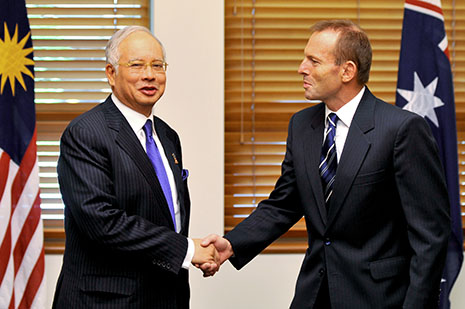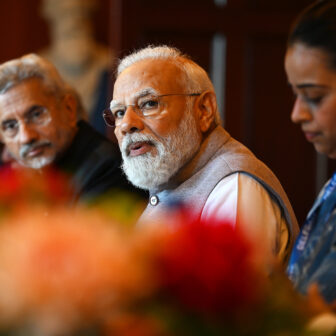THE Australian’s foreign editor, Greg Sheridan, did well to remind us this week of the undervalued importance of Malaysia to Australia’s access to Southeast Asia. As past experience has shown, Malaysian displeasure can pose a formidable obstacle to our regional engagement.
It may also be true that there are several levels, as Sheridan suggests, to Tony Abbott’s expression of “contrition” and its strategic rationale. But let us not hastily overlook the ostensible, surface level.
Tony Abbott apologised to Malaysian PM Najib Tun Razak for scandalising Malaysia in the pursuit of his own partisan political goal of creating a political deadlock, a paralysing impasse, in an effort to make Australia ungovernable by his political opponents.
At the time, Abbott left the heavy hitting against Malaysia to his immigration supremo, and now minister, Scott Morrison, who denounced Malaysia’s far from perfect human rights standards as if our Curtin and Villawood were paradises of sublime liberty.
At least Malaysia was a substantial and genuinely sovereign member of the world community, in good standing. As was argued at the time, this meant it was subject to international pressure to “lift its game” and align itself more closely with international standards in this area – which is more than might have been said about that empty shell of notional sovereignty, Nauru.
While taking the high road and leaving the lower to Morrison, Abbott insisted that Australia could not send asylum seekers to countries that were not signatories to the UN Human Rights Charter. Yet this same scruple had not stopped the Howard government sending people to Nauru following the Tampa confrontation, and that didn’t stop it using methods personally overseen by our defence minister, Peter Reith – methods glimpsed on television despite the restraints he imposed – that fell far short of those same humanitarian requirements.
Abbott maintained that “Malaysia is a friend of Australia, but their standards are not our standards – and it is very wrong of Australia to send people who have come into our care, however briefly, to a country whose standards are so different from ours.” In consequence, he said, “the Malaysian people-swap is not offshore processing, it’s offshore dumping.”
Malaysians, we may be sure, were hardly delighted to see their country described by a leading Australian politician and prospective national leader as a human dumping ground.
When the so-called Malaysian Solution came to a vote in House of Representatives and Abbott persisted in blocking it, Sheridan lamented that his “refusal to pass this legislation is Tony Abbott’s worst decision in politics.” Sheridan’s senior colleague at the Australian, Paul Kelly, chimed in to support the plan and rebuke Abbott, declaring “it is incredible that the Liberal Party is so fixated on playing politics that it threatens to kill offshore processing outside the phoney solution of Nauru… Abbott needs to rethink.”
Is an apology now due only to Malaysia? An apology to the Australian people might also be in order – and one, too, to those who were pilloried for trying to promote the Malaysian plan despite Malaysia’s acknowledged imperfections.
As he seeks to appease his Malaysian counterpart, our prime minister now joins Sheridan, and many others at the time, by conceding that the agreement with Malaysia had its merits and deserved to be tested then in practice. He had not been against Malaysia, he now pleads, nor against the Malaysian Solution itself, only against his political adversary, our government.
After his attendance at this week’s East Asia Summit in Brunei, Abbott now avers that is not Australia’s role to lecture others in the region about human rights or to impose its standards on them. That was then, this is now.
Over his adamant opposition to the Malaysian plan, which he now admits had its undeniable merits (and which he apparently seeks to resuscitate), is there contrition, as Tony Abbott now wishes to suggest? I think not. He now regrets not his actions but their consequences, particularly the offshore problems they may now pose to him as Australia’s prime minister.
It was not (as he now pleads) “domestic politics” that impugned the same Malaysia that our PM is now happy to embrace and mollify. It was Tony Abbott himself, with the very personal zeal of his oppositional obstructionism, who cast the slur. Not domestic politics, but his own intransigent conduct of them, his own implacable pursuit of the partisan agenda of fatally undermining his political adversaries, was responsible for what our PM now, at some national cost to us, seeks to have Malaysia generously overlook.
But can they reasonably be expected to do so? He, and we, may hope. But Malaysians, as Dr Mahathir for so long delighted in reminding us, have a very long memory for affronts to their national dignity. And they extract their compensation, amply and over an extended period.
To our own new head of government, Prime Minister Najib may himself be a gentleman, a forgiving and understanding leadership partner. But as with Paul Keating’s “recalcitrant” stumble, there are many active and aspiring players in Malaysian nationalist politics who will hold onto Abbott’s moment of calculating imprudence, his seeking of a short-term domestic political gain at their own reputational expense. And they will use it for all it is worth, and for as long as it may still work.
That is likely to be far longer than it takes to offer a brief ceremonial utterance of contrition. •




